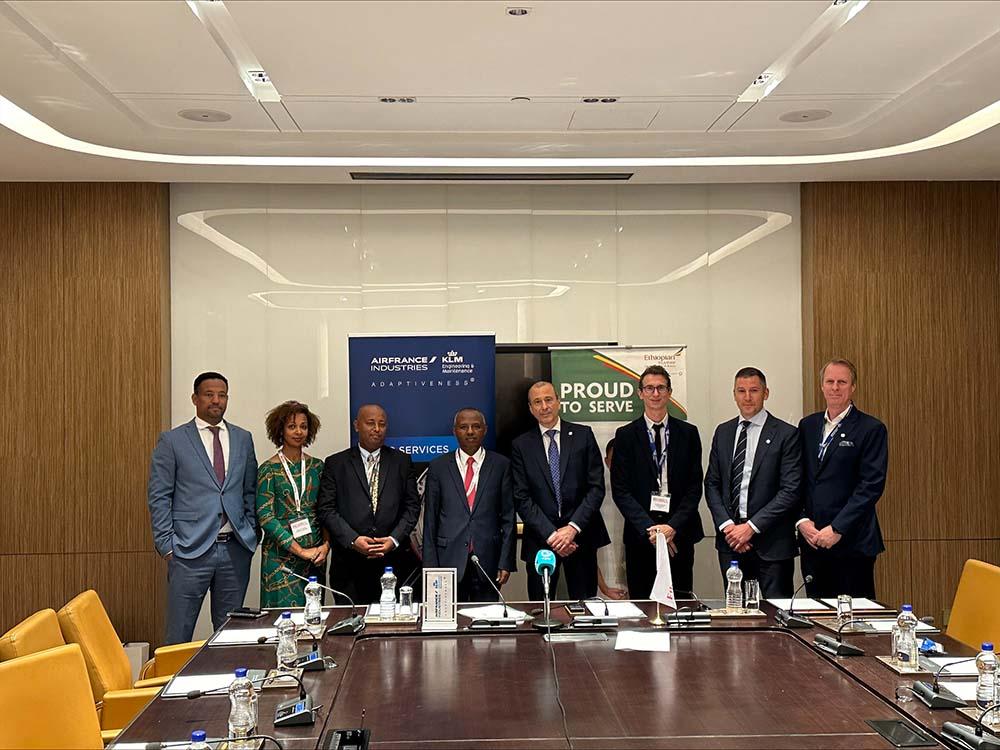
AFI KLM E&M's recent component support agreement with Ethiopian Airlines covers the airline's Boeing 777 fleet.
AFI KLM E&M anticipates plenty of maintenance demand in Africa. The MRO provider recently clinched three new support contracts with Ethiopian Airlines, Air Tanzania and TAAG Angola Airlines for component services on the Boeing 777 and 737 MAX 9 platforms.
Growing fleets in the region are boosting demand and creating an appetite for more support across various services on airframe, components, auxiliary power units, cabin refurbishment and engines.
Aymeric Mechin, AFI KLM E&M’s vice president of sales for the Middle East and Africa, tells Aviation Week Network that this demand is further exacerbated by the significant supply chain disruptions and the scarcity of capacities. For instance, on airframe, he sees the shortage in slots as a need for more industry capacity.
This lack of capacity has led to AeroTechnic Industries, a joint venture between Royal Air Maroc and Air France in Casablanca, extending its capabilities to perform light and heavy maintenance checks for Airbus A320 and 737 families.
Mechin reckons airlines are now anticipating medium-term MRO needs as a consequence of slot scarcity. He suggests this anticipation is crucial, considering the significant orders coming from various African operators. He argues supply chain issues have led to dissatisfaction among several airlines with their current MRO providers, presenting unexpected opportunities for companies such as AFI KLM E&M.
African airlines operate in a high-cost environment, and the impact of rising component repair costs due to global material supply issues is indeed significant. However, Mechin dispels the perception that pricing applied in Africa differs from other parts of the world, arguing that the impact is similar worldwide, driven by inflation and escalating prices.
“The imbalance between low supply and high demand is a normal and expected consequence of the current situation, and this is not unique to Africa but rather a global phenomenon,” he says.
Access to a reliable pool is one way of addressing these challenges. The recent contract with Ethiopian Airlines supports the entire 777 fleet of up to 25 aircraft, so AFI KLM E&M will rely on proactive measures and strategic foresight to ensure a consistent coverage of all components for Ethiopian. Mechin says the strategy revolves around pooling resources to ensure ready access to a stock of critical components to minimize downtime.
Mechin also thinks the competitive advantage lies with AFI KLM E&M’s Prognos predictive maintenance tool, which is used to foresee potential component failures and schedule maintenance tasks preemptively, avoiding disruptions and AOGs.
Collaboration is a key focus for AFI KLM E&M, too, especially in joint activities and training to enhance its customers’ in-house maintenance capabilities. Mechin suggests the “repair rather than replace” approach might mitigate long lead times.
The new contract with TAAG Angola covers five years of pool and component repair support for the 777 fleet. The agreement encompasses a main base kit tailored specifically for TAAG’s 777s, including essential components necessary to ensure the smooth operation of their aircraft.
According to Mechin, establishing a local base in Angola fortifies TAAG's operations by providing swift access to critical parts without the need for lengthy international procurement processes. “This set-up enhances the overall service experience for TAAG, allowing them to maintain operational continuity with minimal disruptions,” he adds.





